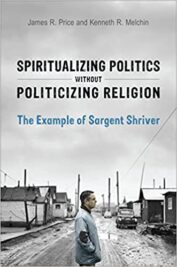
By James R. Price and Kenneth R. Melchin. Maintains that there is need for an approach that can both maintain the diversity of belief and foster values founded on the principles of religion. Provides a framework by approaching issues in politics via a profile of Sargent Shriver (1915–2011), an American diplomat, politician, and a driving force behind the creation of the Peace Corps. Focusing on the speeches Shriver delivered in the course of his work to advance civil rights and build world peace, highlights the spiritual component of his efforts to improve institutional structures and solve social problems. Contextualizes Shriver’s approach by contrasting it with contemporary, landmark decisions of the U.S. Supreme Court on the role of religion in politics. In doing so, explains that navigating the relationship of religion and politics requires attending to both the religious diversity that politics must guard and the religious involvements that politics needs to do its work. Read more.
